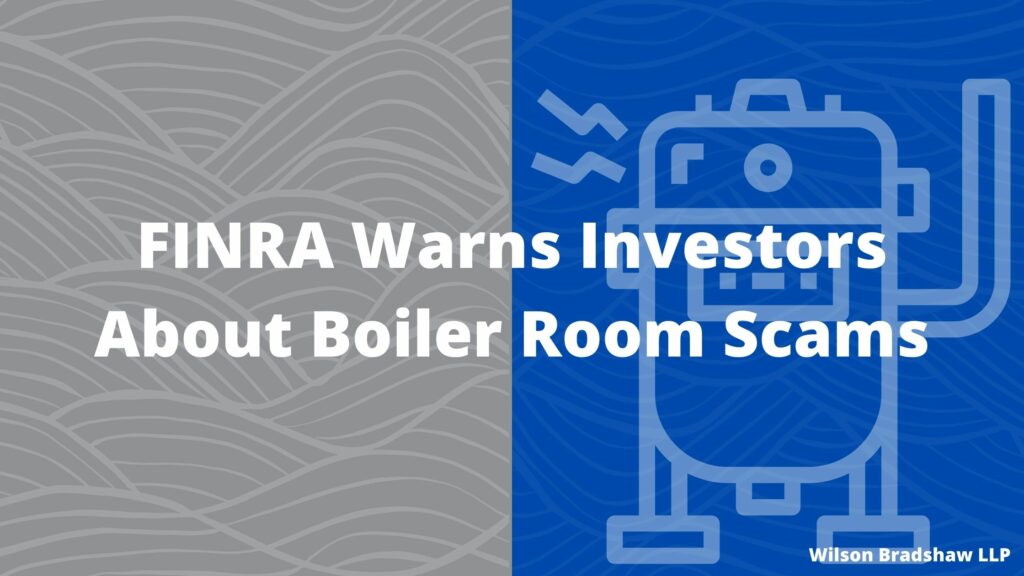Angelita Plemmer Williams (202) 728-8988
Nancy Condon (202) 729-8379
If You Get a Call Like This, Don’t Bite—and Don’t Buy
WASHINGTON — Boiler room-style calls touting the next hot stock are alive and well, and they’re costing investors dearly, according to anInvestor Alert issued today by the Financial Industry Regulatory Authority (FINRA).
Numerous consumers—particularly seniors—have contacted FINRA complaining of receiving high-pressure telephone sales calls urging them to buy penny stocks and other speculative investments. Unfortunately, some of those consumers sent—and lost—money
“Cold calling can be a legitimate way for businesses to connect with potential new customers. But boiler room con artists don’t just take the tactic too far, some might in fact be breaking the law,” said Gerri Walsh, Senior Vice President for FINRA’s Office of Investor Education. “Aggressive pitches and repeated calling, coupled with promises of high returns, can signal a scam. If you receive a boiler room call, the best course of action is to calmly say no and hang up the phone,” Walsh said.
If consumers have questions or concerns about a caller or investment, consumers can speak to a representative at FINRA’s Securities Helpline for Seniors (1-844-574-3577). FINRA has received more than 5,000 calls and recovered more than $2 million for consumers since it launched its Securities Helpline for Seniors in April 2015.
The Alert lists a number of common characteristics of these recent boiler room scams:
- Callers use hard-sell tactics to pressure investors into buying shares that promise high returns on “can’t-miss” investment opportunities. Repeated, and more aggressive, calls are common. The investments touted are often low-priced “penny” ormicrocap stocks. Investors who purchase shares often find that the sales pitches are fraudulent and the shares they bought are virtually worthless.
- Callers purport to work for organizations that offer stock recommendations. However, the organizations are not registered with FINRA, not associated with any FINRA-registered firm, and in most cases, may not be involved with any legitimate business entity. The callers may use fake names and credentials, or disguise their phone numbers to make it appear as if the call is from a reputable broker-dealer or firm (also known as Caller ID “spoofing”). Use FINRA BrokerCheck to verify if a firm or individual is registered to sell securities and to check the background of the individual calling you.
- Con artists engage in “pump-and-dump” scams, in which victims are tricked into buying shares through a legitimate broker to inflate a stock’s price. One elderly couple was talked into buying nearly $900,000 worth of virtually worthless microcap stocks. Another senior investor purchased more than $500,000 of a microcap stock while on the phone with the caller.
- In some cases, cold callers are simply out to steal a victim’s money, a little at a time. One retired investor was talked into sending two checks, totaling $2,500, to what turned out to be a mail drop box, with no actual business associated with the address.
- Not all calls are cold calls. “Account executives” may contact individuals who have visited or signed up with a website that promotes low-priced stocks. The “account executive” or a person associated with the website will make a hard sell for one or more low-priced stocks or other speculative investments.
FINRA offers consumers a number of tips to help them avoid falling prey to a boiler room-style pitch, including hanging up on the caller or simply not answering the phone at all. Investors are also discouraged from making wire transfers or putting investment purchases on a credit card. Consumers should use the Internet to check the validity of addresses, phone numbers and other information about the organization or individual.
If you believe you’re a victim of this scam, act quickly. If you have sent money, contact your financial institution, credit card company or local law enforcement agency to make them aware of your situation and to see if you can stop payment. Consumers can also file a complaint using FINRA’s online Complaint Center or send a tip to FINRA’s Office of the Whistleblower.
FINRA, the Financial Industry Regulatory Authority, is the largest independent regulator for all securities firms doing business in the United States. FINRA is dedicated to investor protection and market integrity through effective and efficient regulation and complementary compliance and technology-based services. FINRA touches virtually every aspect of the securities business – from registering and educating all industry participants to examining securities firms, writing rules, enforcing those rules and the federal securities laws, and informing and educating the investing public. In addition, FINRA provides surveillance and other regulatory services for equities and options markets, as well as trade reporting and other industry utilities. FINRA also administers the largest dispute resolution forum for investors and firms. For more information, please visit www.finra.org.

